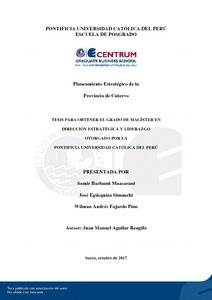| dc.contributor.advisor | Aguilar Rengifo, Juan Manuel | |
| dc.contributor.author | Barhumi Maasarani, Samir | es_ES |
| dc.contributor.author | Egúsquiza Simauchi, José | es_ES |
| dc.contributor.author | Fajardo Pino, Wilman Andrés | es_ES |
| dc.date.accessioned | 2017-10-27T15:12:36Z | |
| dc.date.available | 2017-10-27T15:12:36Z | |
| dc.date.created | 2017 | |
| dc.date.issued | 2017-10-27 | |
| dc.identifier.uri | http://hdl.handle.net/20.500.12404/9590 | |
| dc.description.abstract | Haciendo uso del modelo secuencial del proceso estratégico, diseñado por D’Alessio (2015),
se ha desarrollado el presente planeamiento estratégico para la provincia de Cutervo 2017-
2027. Se inicia con la presentación de la situación general de esta provincia de 140,633
habitantes, ubicada en la región Cajamarca (Inga & Cosavalente, 2016). El análisis externo o
del entorno reveló que, en el Perú, existe un marco legal que promueve la descentralización,
aunque este proceso no se ha podido completar por problemas en el traspaso de
competencias. Además, el país ha establecido acuerdos comerciales, presenta crecimiento
económico y ha reducido la pobreza. Entre las amenazas destaca la desaceleración de la
demanda interna y del consumo privado, combinada con la falta de competitividad e
inversión en tecnología y desarrollo científico. Siguiendo la metodología, también se realizó
un análisis interno que mostró como fortaleza principal la existencia del Parque Nacional
Cutervo y otros recursos naturales para atraer el turismo, que puede ser utilizada para generar
ingresos, pero de una manera sostenible. Otra fortaleza es la existencia de una planta
procesadora de lácteos, que se combina con grandes extensiones de terrenos para actividades
agropecuarias y con una cartera de concesiones mineras. Para explotar conscientemente estos
recursos y alcanzar la visión que se ha propuesto para el año 2027, se implementarán las
siguientes estrategias: (a) desarrollar la producción de leche pasteurizada para la
comercialización directa a mayoristas o minoristas; (b) desarrollar la producción de lácteos
con valor agregado, por ejemplo, los quesos; (c) desarrollar rutas turísticas que
complementen la visita al PNC con otros atractivos naturales; (d) penetrar en el mercado de
turismo nacional, con enfoque en el segmento de turismo ecológico o natural; y (e)
desarrollar infraestructura turística como hospedajes y restaurantes | es_ES |
| dc.description.abstract | Using the sequential model from strategic process, designed by D'Alessio (2015), the present
strategic planning for the province of Cutervo 2017-2027 has been developed. It begins by
presenting the general situation of this province, which is located in the Cajamarca region and
has 140,633 inhabitants (Inga & Cosavalente, 2016). The external or environmental analysis
revealed that there is a legal framework in Peru that promotes decentralization, although this
process has not been completed due to problems in the transfer of competences. In addition,
the country has established trade agreements, presents economic growth and has seen poverty
reduction. Among the threats is the deceleration of domestic demand and private
consumption, combined with lack of competitiveness and investment in technology and
scientific development. Following the methodology was also an internal analysis, which
showed as main strength the existence of the National Park Cutervo and other natural
resources to attract tourism, which can be used to generate income, but in a sustainable way.
Another strength is the existence of a dairy processing plant, which is combined with large
tracts of land for agricultural activities and a portfolio of mining concessions. The following
strategies will be implemented: (a) to develop the production of pasteurized milk for direct
marketing to wholesalers or retailers; (b) developing the production of value-added dairy
products, such as cheeses; (c) develop tourist routes that complement the visit to the PNC
with other natural attractions; (d) penetrate the national tourism market, focused on the
ecological or natural tourism segment; and (e) develop tourist infrastructure such as lodging
and restaurants | es_ES |
| dc.language.iso | spa | es_ES |
| dc.publisher | Pontificia Universidad Católica del Perú | es_ES |
| dc.rights | info:eu-repo/semantics/openAccess | es_ES |
| dc.rights.uri | http://creativecommons.org/licenses/by-nc-nd/2.5/pe/ | * |
| dc.subject | Planificación regional -- Perú -- Cajamarca | es_ES |
| dc.subject | Desarrollo regional -- Perú -- Cajamarca | es_ES |
| dc.subject | Planificación estratégica | es_ES |
| dc.title | Planeamiento estratégico de la Provincia de Cutervo | es_ES |
| dc.type | info:eu-repo/semantics/masterThesis | es_ES |
| thesis.degree.name | Maestro en Dirección Estratégica y Liderazgo | es_ES |
| thesis.degree.level | Maestría | es_ES |
| thesis.degree.grantor | Pontificia Universidad Católica del Perú. CENTRUM | es_ES |
| thesis.degree.discipline | Dirección Estratégica y Liderazgo | es_ES |
| renati.discipline | 419397 | es_ES |
| renati.level | https://purl.org/pe-repo/renati/level#maestro | es_ES |
| renati.type | https://purl.org/pe-repo/renati/type#tesis | es_ES |
| dc.publisher.country | PE | es_ES |
| dc.subject.ocde | https://purl.org/pe-repo/ocde/ford#5.02.04 | es_ES |






